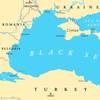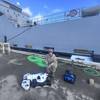EU Sea Rescue Mission Extended
The European Commission extended its rescue mission off Italy until at least the end of the year, it said on Thursday, and gave Rome extra funding to deal with an influx of migrants from Africa and the Middle East.
The Commission launched the mission, dubbed Operation Triton, in November just as Italy wound down a much larger and more costly programme known as Mare Nostrum.
Triton, managed by the European Union's border control agency Frontex, was only expected to run for a few months and has fewer ships and a smaller operational area than Mare Nostrum -- drawing criticism from human rights groups.
"We are willing to go further," said Home Affairs Commissioner Dimitris Avramopoulos. "Europe needs to manage migration better, in all aspects."
More than 5,000 migrants have reached Italy so far this year on rickety boats that mostly set sail from Libya, despite winter storms that usually slow the flow.
The head of Frontex told Reuters this week that the recent flood of arrivals suggested a record number of migrants would travel to Europe this year, spurred on by turbulence across much of the Arab world and Africa.
Given the growing pressure, the Commission on Thursday handed Italy 13.7 million euros ($15.61 million) of emergency funding, which came on top of more than 500 million euros earmarked for Rome for the 2014-2020 period.
"We cannot replace Italy in the management of the external borders, but we can lend a helping hand," Avramopoulos said.
Mare Nostrum saved the lives of more than 100,000 migrants in little over a year, but it put a huge strain on Italy's finances, costing some 9 million euros a month.
Operation Triton costs between 1.5 million and 2.9 million euros a month and has no operational resources of its own, depending on contributions from EU member states.
It currently deploys nine boats and two aircraft, which patrol waters within 30 nautical miles of Italy. Mare Nostrum reached across the Mediterranean to the coast off Libya.
An estimated 3,300 people died last year trying to cross the Mediterranean, and earlier this month more than 300 people are believed to have died after leaving Libya in inflatable rafts that were not sea worthy.
In the wake of those deaths, the United Nation's refugee agency said Operation Triton was woefully inadequate, and urged Europe to take a new approach.
Amnesty International criticised Thursday's EU move.
"Extending Operation Triton without increasing its assets and operational area changes nothing," said Iverna McGowan, acting director of the rights group's Brussels office.By Julia Fioretti











